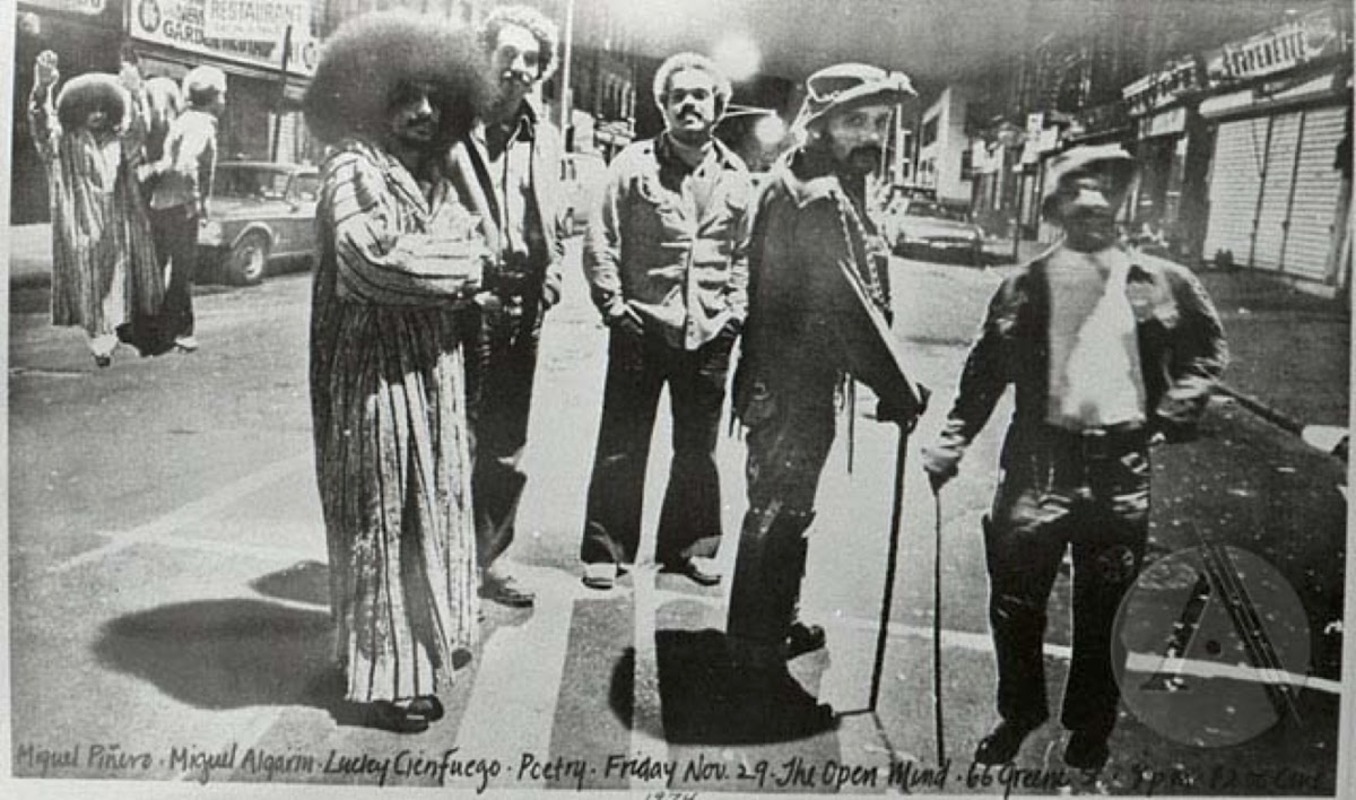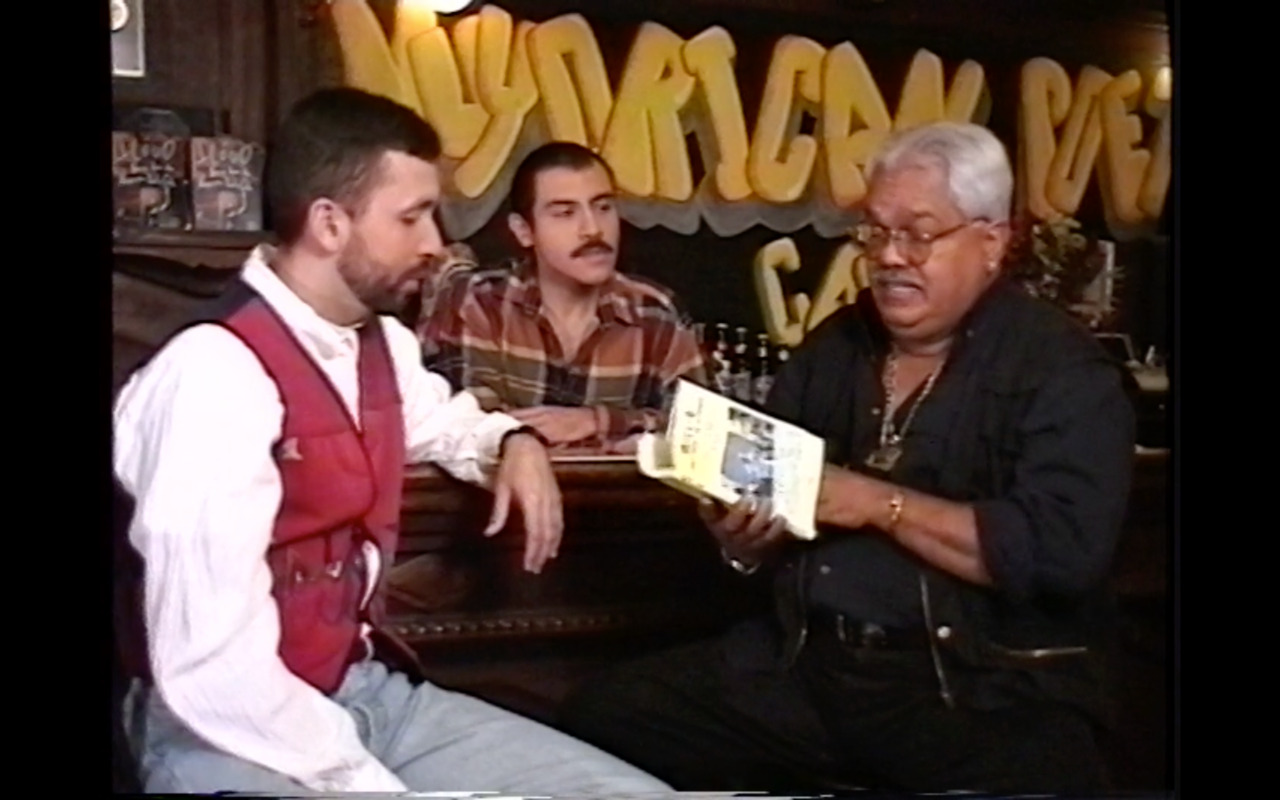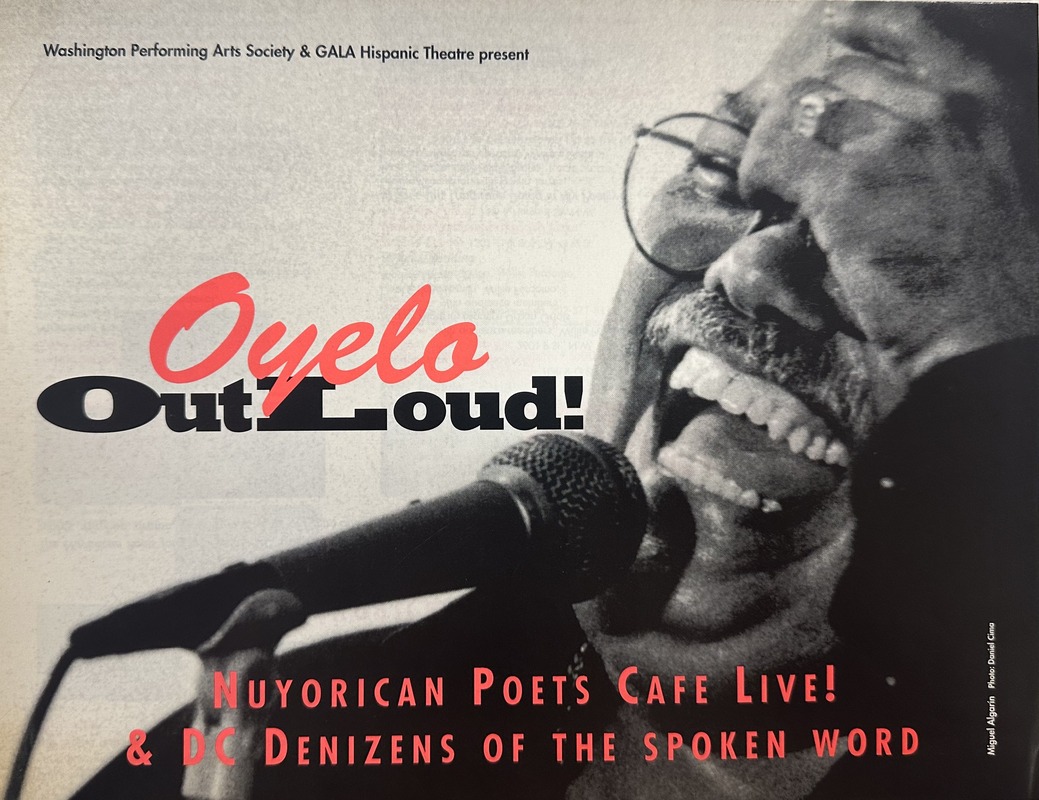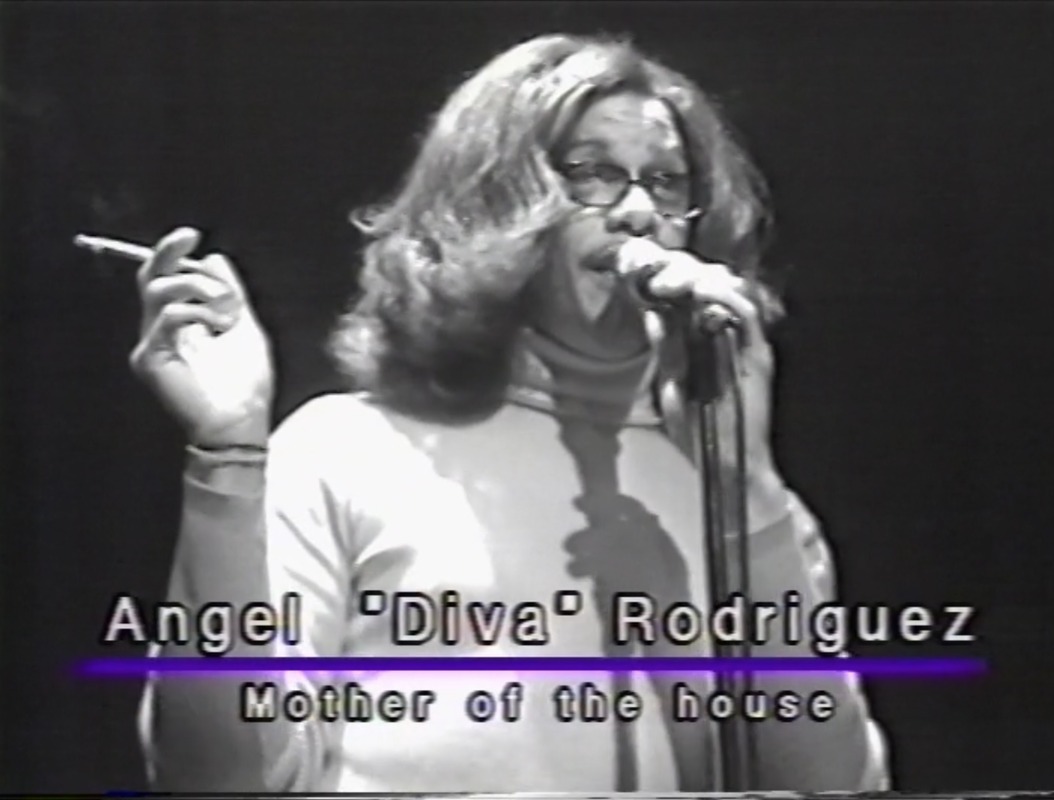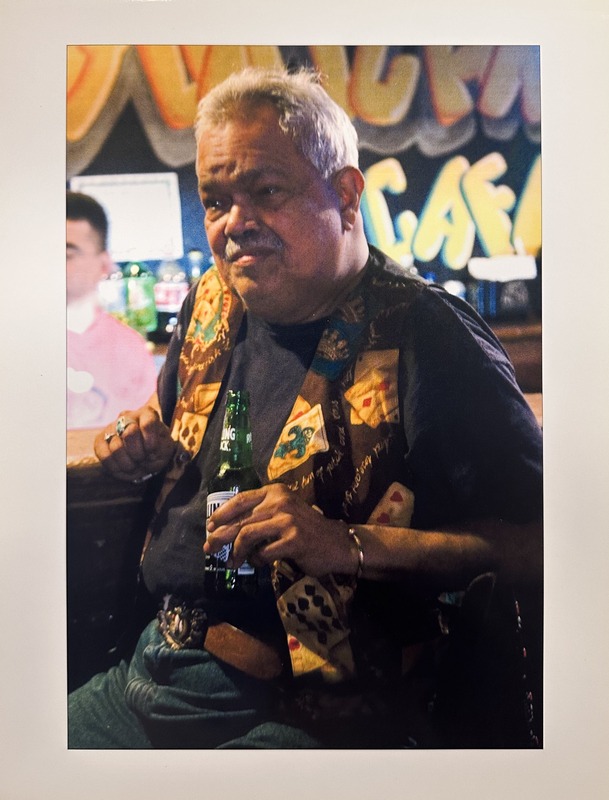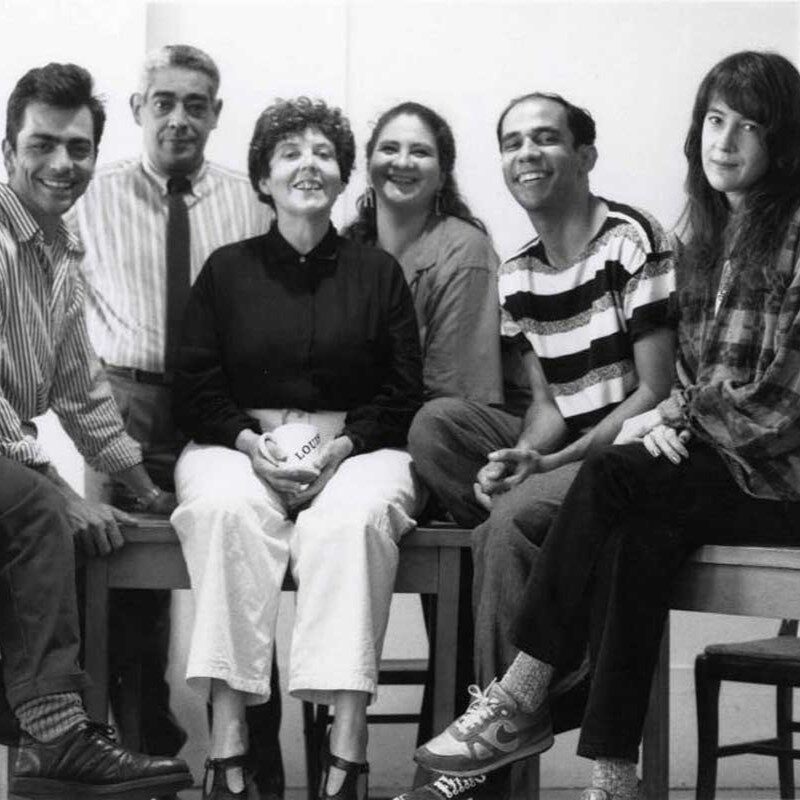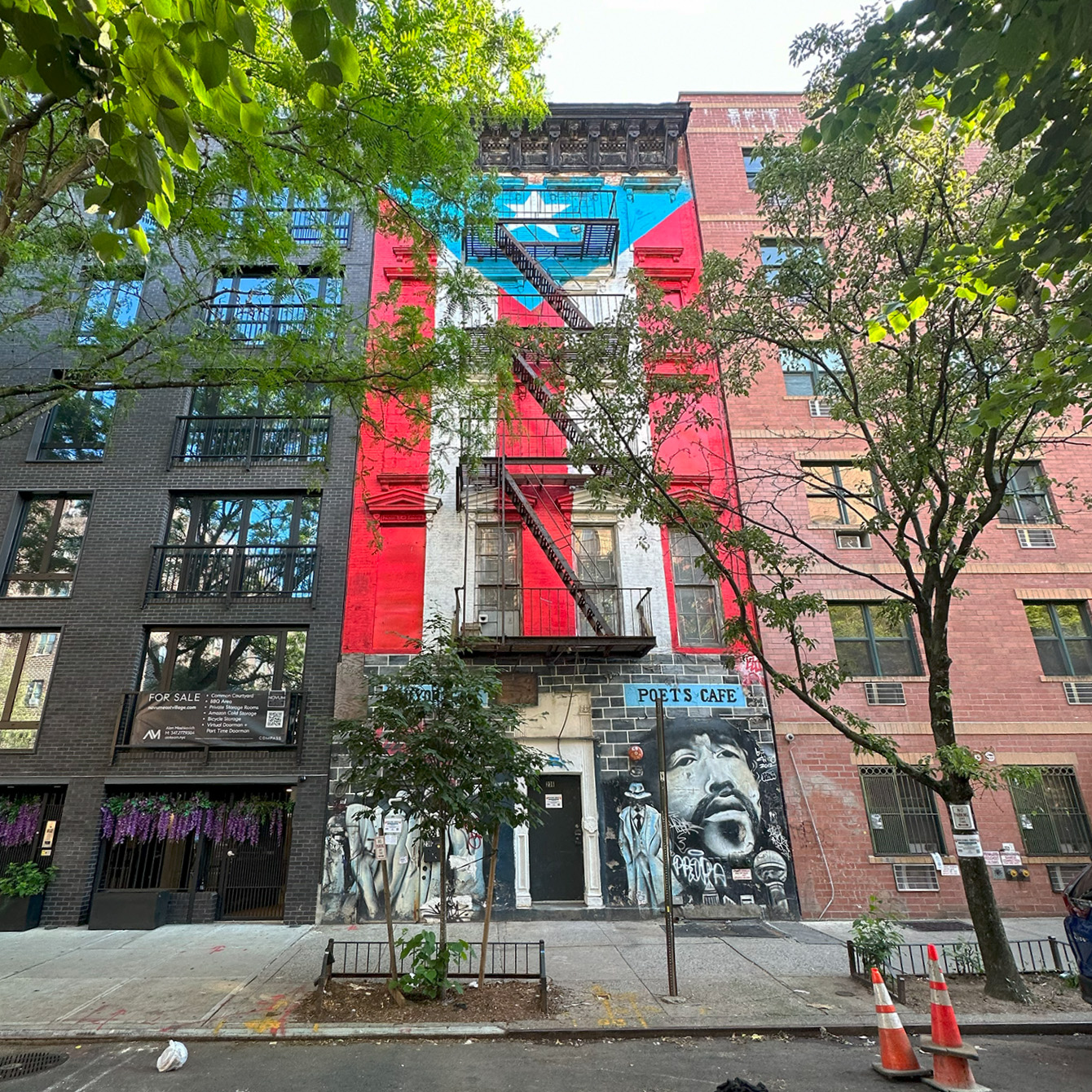
Nuyorican Poets Café
overview
Founded in 1973, the Nuyorican Poets Café has operated on the first floor of this building since 1981.
It has served as a space to validate and celebrate the complex experiences of the Puerto Rican community in New York City, particularly on the Lower East Side (or “Loisaida”), and has important LGBT associations.
History
Founded in 1973, the Nuyorican Poets Café began as a series of informal poetry readings at the 524 East 6th Street apartment of writer and poet Miguel Algarín, which he shared with then-partner and Café co-founder Richard August. Except for August and Afro-Caribbean writer Lois Elaine Griffith, the co-founders, including Algarín, were Puerto Rican: poet and playwright Miguel Piñero, poet and activist Pedro Pietri, poet Sandra María Esteves (who was also Dominican), poet and activist Bittman John “Bimbo” Rivas, and poet Lucky CienFuegos. In October 1974, facing limited space in Algarín’s apartment, the artists began renting the storefront space at 505 East 6th Street.
In May 1981, with its programs outgrowing the rented space, the Café’s nonprofit corporation purchased the building at 236 East 3rd Street, previously owned and used by La MaMa as lodging for Black musicians. The Café, located in “Loisaida” (Spanglish for Lower East Side), was part of the Nuyorican artistic, cultural, and intellectual movement, which focused on the socioeconomic and political realities of Puerto Rican migrants living in New York City, also known as Nuyoricans. Through performance, graphic art, and a prominent use of Spanglish, the Nuyorican movement provided a voice for the Puerto Rican experience in the United States. The movement rose in influence through the publication of The Nuyorican Poetry Anthology (1975; edited by Café co-founders Algarín and Piñero) and the production of Piñero’s play Short Eyes which was nominated for six Tony Awards, won the New York Critics Circle Award for Best American Play, and received the Obie Award for “the best play of the year.”
In the spring of 1982, after premiering Cries and Shouts, the first play of Cuban-American playwright Reinaldo Povod, the Nuyorican Poets Café closed its doors for what was supposed to be a temporary renovation funded by the federal government and the New York City Department of Cultural Affairs.
Due to ongoing renovations and Piñero’s death in 1988, the Café remained closed until Algarín reopened it in 1989 with the help of slam poet Bob Holman. (A movement started in Chicago in the 1980s, poetry slams are where poets perform before a live audience and a panel of judges.) In this second iteration, the Café expanded its programming to include poetry slams, open mics, jazz and hip-hop concerts, educational and theater programs, and art exhibitions. Also recognizing the neighborhood’s diversity, the Nuyorican Poets Café shifted to embrace and give visibility to other underrepresented artists besides those who were Nuyorican. It was commonly frequented by poets such as Amiri Baraka, Gregory Corso, William S. Burroughs, Hattie Gossett, and Allen Ginsberg, who allegedly described the Café as “the most integrated place on the planet.” Famed choreographer Alvin Ailey was also a regular.
Within this context, more LGBT artists began participating and presenting at the Café. In 1993, gay Filipino poet and activist Regie Cabico earned the Nuyorican Grand Slam Champion title at one of the poetry slam competitions held at the Café. A 1994 episode of HoMoVISIONES featured the Café, noting the series of gay and lesbian poetry and other programs that catered to the LGBT community. In October 1999, Ecuadorian-Puerto Rican poet and novelist Emanuel Xavier introduced the Glam Slam to the Café as a combination of poetry slam and ballroom elements:
The Glam Slam, modeled on the competitive balls of New York’s Black and caribeño gay, drag, and trans communities, included poets walking the runway and, instead of voguing against one another, performing poetry in categories that included ‘Best Love Poem in Fire Engine Red’ and ‘Best Wig-a-Poem,’ among others.
While initiated at the Henry Miller’s Theater in 1998, the Café’s hosting linked the slam poetry activities to the LGBT Latino community. The judges of the 1999 Grand Slam notably included Willi Ninja and Héctor “Xtravaganza” Valle, accompanied by film director Sini Anderson, poet Eileen Myles, and columnist Michael Musto. In later years, the Grand Slam continued at the Bowery Poetry Club.
In November 2023, as part of its 50th anniversary, the Café temporarily closed its doors for a three-year building renovation, taking its activities to venues around Loisaida.
Entry by Andrés Santana-Miranda, project consultant (July 2024; rev. February 2025).
NOTE: Names above in bold indicate LGBT people.
Building Information
- Architect or Builder: John M. Forster
- Year Built: 1877
Sources
Ashley Lucas, “Prisoners on the Great White Way: Short Eyes and Zoot Suit as the First US Latina/o Plays on Broadway,” Latin American Theatre Review 43, no. 1 (Fall 2009): 121-136.
Charlie Vázquez, “On Controversy, Looking Back, and The Selected Poems of Emanuel Xavier,” Lambda Literary, June 14, 2021.
Ed Morales, “Remembering Miguel Algarín, a Founder of the Nuyorican Poets Cafe,” The New York Times, December 4, 2020.
Karen Jaime, “Miguel Piñero,” in Fifty Key Figures in Queer US Theatre, ed. Jimmy A. Noriega and Jordan Schildcrout (Oxon: Routledge, 2023).
Karen Jaime, The Queer Nuyorican: Racialized Sexualities and Aesthetics in Loisaida (New York: New York University Press, 2021) [source of pull quote].
Miguel Algarín Papers, Archives of the Puerto Rican Diaspora, Center for Puerto Rican Studies, Hunter College, CUNY.
Urayoán Noel, In Visible Movement: Nuyorican Poetry from the Sixties to Slam (Iowa City: University of Iowa Press, 2014).
Read More
Do you have more information about this site?
This project is enriched by your participation! Do you have your own images of this site? Or a story to share? Would you like to suggest a different historic site?
